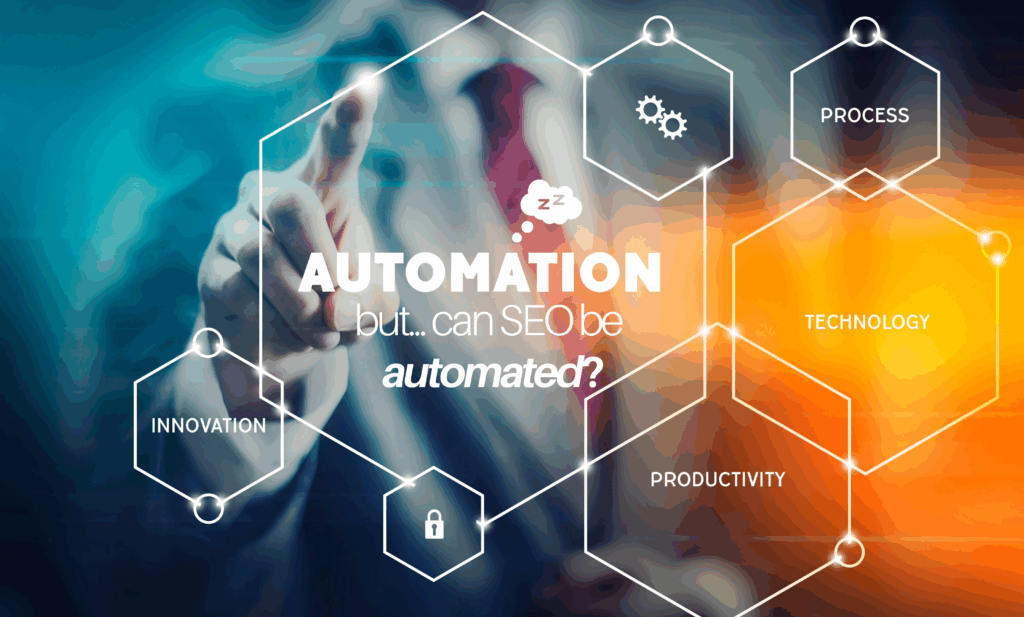Search engine optimization has always been essential for online growth, but it’s also known for being time-consuming, complex, and expensive. From keyword research to link building and technical audits, SEO often overwhelms small and mid-sized businesses that lack the resources of big brands.
This is where SEO automation enters the picture. By using the right technology, many repetitive and data-heavy tasks can be automated, freeing up time and making SEO more efficient. But can SEO really be automated — and if so, how far can automation go without losing quality?
In this guide, we’ll break down what SEO automation is, which tasks can be automated, where human creativity still matters, and how Aysa takes SEO automation to the next level.
After more than 25 years in SEO, I’ve learned that most businesses don’t fail because SEO doesn’t work — they fail because they can’t execute consistently. That’s why we built Aysa: to automate the heavy lifting and let entrepreneurs focus on growing their business..
What is SEO automation?
SEO automation is the use of software and AI-powered tools to handle repetitive, data-heavy, and time-consuming SEO tasks. Instead of manually checking rankings, crawling pages, or generating endless reports, automation helps complete these tasks faster, with less human effort and greater consistency.
At its core, SEO automation is not about replacing strategy or creativity — it’s about freeing teams from manual work so they can focus on growth.
Examples of tasks commonly automated in SEO include:
- Tracking keyword rankings across multiple locations and devices
- Running site audits to detect errors and performance issues
- Generating SEO performance reports for stakeholders
- Suggesting or implementing internal linking opportunities
- Monitoring backlinks and competitor activity
Traditional tools (like Looker Studio for reporting or Screaming Frog for crawling) already cover parts of this process. However, they often stop at insights and still leave execution up to you or your agency.
This is the gap where true automation — and platforms like Aysa — come in.

Can SEO really be automated?
Yes — but only to a point. SEO combines structured, repeatable processes with creative and strategic work. Automation is highly effective for the repetitive parts, but it cannot fully replace human judgment and creativity.
What can be fully automated:
- Running website crawls and detecting technical errors
- Tracking keyword positions daily or weekly
- Generating reports and dashboards
- Scheduling link placements through verified publisher networks
What can be partially automated:
- Keyword research (AI can suggest and cluster keywords, but priorities still need human validation)
- Content creation (AI drafts and optimizes, while humans refine tone and brand voice)
- Competitor analysis (tools highlight gaps, but humans decide which ones to pursue)
What should remain human-driven:
- Brand messaging and storytelling
- Strategic decisions about markets, audiences, and goals
- Building trust and authority through authentic communication
In other words: automation handles the heavy lifting, humans bring the strategy.
Most SEO tools today only cover the “reporting” side of automation. They show you problems but leave execution in your hands. Aysa goes further — it automates execution itself, from keyword discovery to content, links, and technical fixes.
Why automate SEO?
Automating SEO isn’t just about saving time — it’s about making growth predictable and accessible for businesses that don’t have big marketing teams or budgets. Here are the core benefits:
1. Time savings
Repetitive tasks like crawling, reporting, and rank tracking eat up hours each week. Automation gives that time back so founders and marketers can focus on strategy, sales, and customers.
2. Cost efficiency
Hiring agencies or in-house SEO specialists is expensive. Automation reduces overhead by handling routine work for a fraction of the cost, while still delivering consistent execution.
3. Consistency and scalability
SEO requires steady action: publishing content, fixing errors, building links. Humans are inconsistent by nature, but automation ensures these tasks happen regularly, every week, without fail.
4. Measurable results
Automation ties actions directly to outcomes. Instead of vague reports, businesses can see: “These 3,000 credits built 6 backlinks, optimized 15 pages, and improved rankings for 20 keywords.”
5. Higher ROI
By saving time, reducing costs, and improving performance, automation lifts ROI. Businesses grow traffic and sales without increasing headcount or burning budgets.
Traditional SEO tools highlight problems. Aysa automates the solutions, giving SMBs the same growth potential as enterprise-level teams — but at startup-friendly prices.
How to automate SEO: 5 core tasks
Not every SEO task can or should be automated, but the ones that require repetition and data processing are ideal candidates. Here are five core tasks you can automate today:
1. Keyword discovery and research
Finding the right keywords is the foundation of SEO, but manual research is slow and error-prone. Automation tools can scan search volumes, competitor rankings, and semantic clusters to surface keyword opportunities instantly.
? In Aysa, keyword discovery is not only automated but also mapped directly to the right pages, saving hours of manual sorting.
2. Content creation and optimization
AI-powered writing can generate drafts, meta tags, and product descriptions in seconds. While human review is still essential for brand tone and storytelling, automation removes 80% of the manual work.
? Aysa automates content briefs, optimizations, and even multilingual SEO updates.
3. Technical SEO monitoring
Crawling for broken links, redirects, indexation issues, or site speed bottlenecks doesn’t need a human. Automation can flag problems and even trigger fixes.
? Aysa runs automated audits and suggests or applies corrections to keep sites technically sound.
4. Link building orchestration
Backlinks remain critical for rankings, but outreach is time-consuming. Automation makes the process scalable by managing placements and validation through a publisher marketplace.
? Aysa integrates directly with AdverLink, giving businesses automated, quality-controlled backlinks.
5. Reporting and analytics
Compiling weekly or monthly SEO reports manually is inefficient. Automated dashboards tie actions to results, showing exactly what’s working.
? Aysa connects execution with analytics, so reports show outcomes, not just numbers.
Where human creativity still matters
Even in the era of AI and automation, SEO is not a “set it and forget it” process. Machines excel at repetitive work, but there are areas where human judgment is irreplaceable:
1. Brand storytelling
Automation can generate text, but it can’t capture the unique voice, values, and story of your business. Humans give content personality and emotional connection.
2. Strategic choices
Deciding which markets to enter, which audiences to target, or how aggressively to compete cannot be automated. These decisions depend on vision, goals, and risk tolerance.
3. Creativity and differentiation
SEO isn’t just about rankings. It’s about creating experiences that make people trust and choose your business. That spark of originality comes from people, not algorithms.
4. Relationship building
Partnerships, PR, and influencer outreach still require human interaction and negotiation. Automation can’t replace trust between people.
That’s why the future of SEO is not automation vs. humans, but automation + humans. Tools like Aysa take care of the heavy lifting — keyword mapping, technical fixes, link orchestration — while humans focus on creativity, storytelling, and strategy.
Case Studies: SEO Automation in Action
Automation is only valuable if it delivers real results. Here are examples of how businesses already benefit from Aysa’s execution-first approach:
Adeomed (Healthcare)
- Niche: pediatrics and neonatology clinic
- Results: +230% year-over-year organic growth, 2,500+ monthly visitors, top 1 rankings on priority keywords
- How Aysa helped: automated content optimization and continuous technical monitoring kept the site fast, compliant, and visible.
Parkado (Airport Parking)
- Niche: travel and parking services
- Results: average 25% occupancy year-round, 100% occupancy during peak seasons (Easter, summer, Christmas)
- How Aysa helped: keyword discovery + local SEO automation drove seasonal visibility exactly when demand peaked.
Rentado (Car Rentals)
- Niche: auto rentals
- Results: streamlined booking flow, increased organic traffic, stronger presence in competitive local searches
- How Aysa helped: link building through AdverLink marketplace built authority and improved rankings faster.
Smilemed (Dental Clinic)
- Niche: healthcare / dentistry
- Results: consistent appointments and strong positioning on competitive keywords
- How Aysa helped: automated keyword tracking and content optimization ensured the clinic stayed on top in a crowded market.
Takeaway: These businesses didn’t just get reports or keyword lists. They got daily SEO execution: optimized content, backlinks, and fixes — all measurable and tied to growth. That’s the difference Aysa makes.
The Future: SEO in the AEO Era
Search is changing fast. Google is rolling out AI Overviews, and platforms like ChatGPT, Perplexity, and Claude are shaping how people find answers online. This shift is called AEO — Answer Engine Optimization.
In AEO, success is no longer just about ranking in the top 10. It’s about being selected as the answer. That requires content that’s structured, clear, and supported by strong authority signals.
What AEO means for businesses:
- Featured snippets and AI answers replace traditional organic clicks.
- Clean markup, structured data, and semantic SEO are critical.
- Signals like backlinks, trust, and freshness matter more than ever.
How Aysa is built for AEO:
- Automates schema markup and structured content generation.
- Orchestrates backlinks from trusted publishers to build authority.
- Tracks CTR vs. position to adjust strategy when AI Overviews reduce traffic.
- Generates answer-focused content designed to be cited by AI engines.
The future of SEO is not just search engine optimization — it’s answer engine optimization. And Aysa is designed as the first SEO Operating System to help businesses win visibility in this new landscape.
So… can SEO Be Automated?
Yes — but only the right way. SEO automation is not about replacing strategy or creativity. It’s about removing the repetitive, time-consuming work that slows businesses down. Keyword discovery, technical audits, content optimization, link building, and reporting can all be automated. What remains human is vision, creativity, and brand storytelling.
Traditional tools stop at insights. Aysa goes further — it automates execution. With Aysa, SMBs get enterprise-level SEO power: keywords mapped, content optimized, links built, issues fixed, and results tracked — all in one affordable platform.
The bottom line: SEO can and should be automated, but not blindly. It requires a system built on decades of experience in SEO, eCommerce, and technology. That’s what Aysa delivers.
Not convinced…Let us show you!!
Ready to see what SEO automation can do for your business?
Join our private beta and experience how Aysa transforms insights into daily SEO actions that drive measurable growth.

